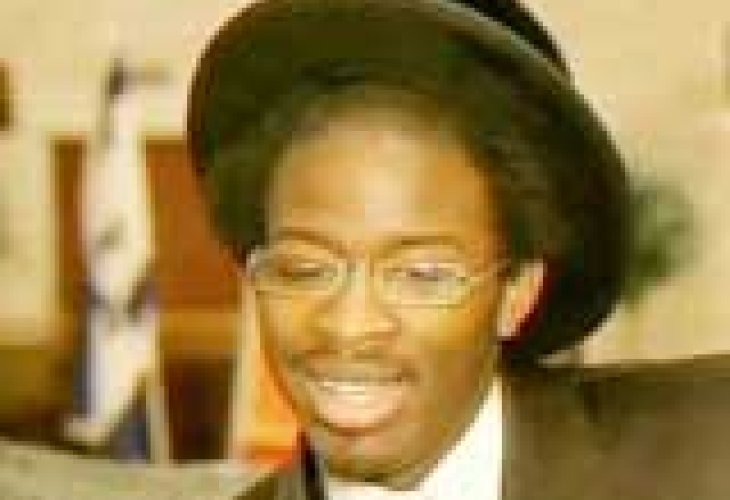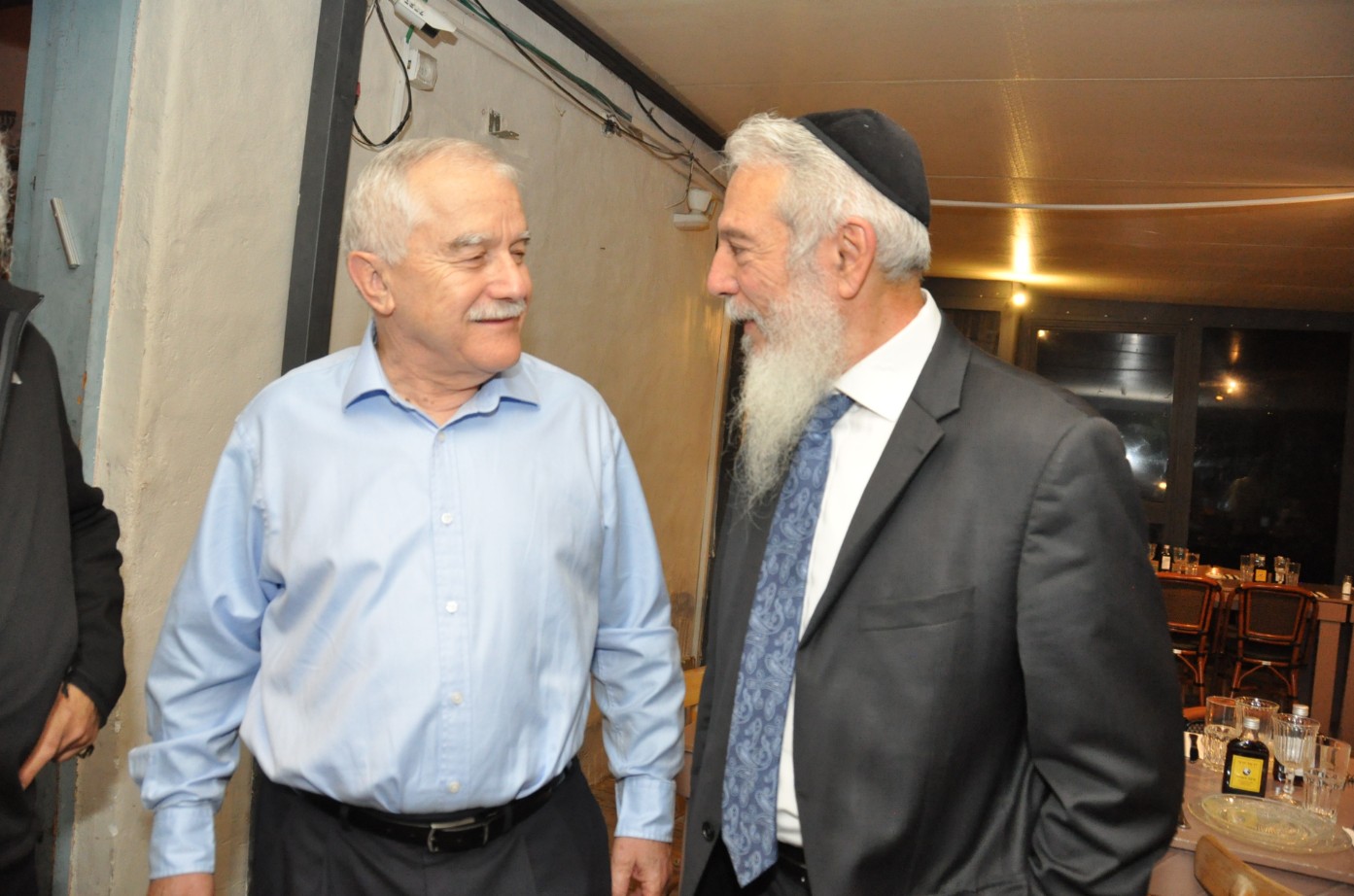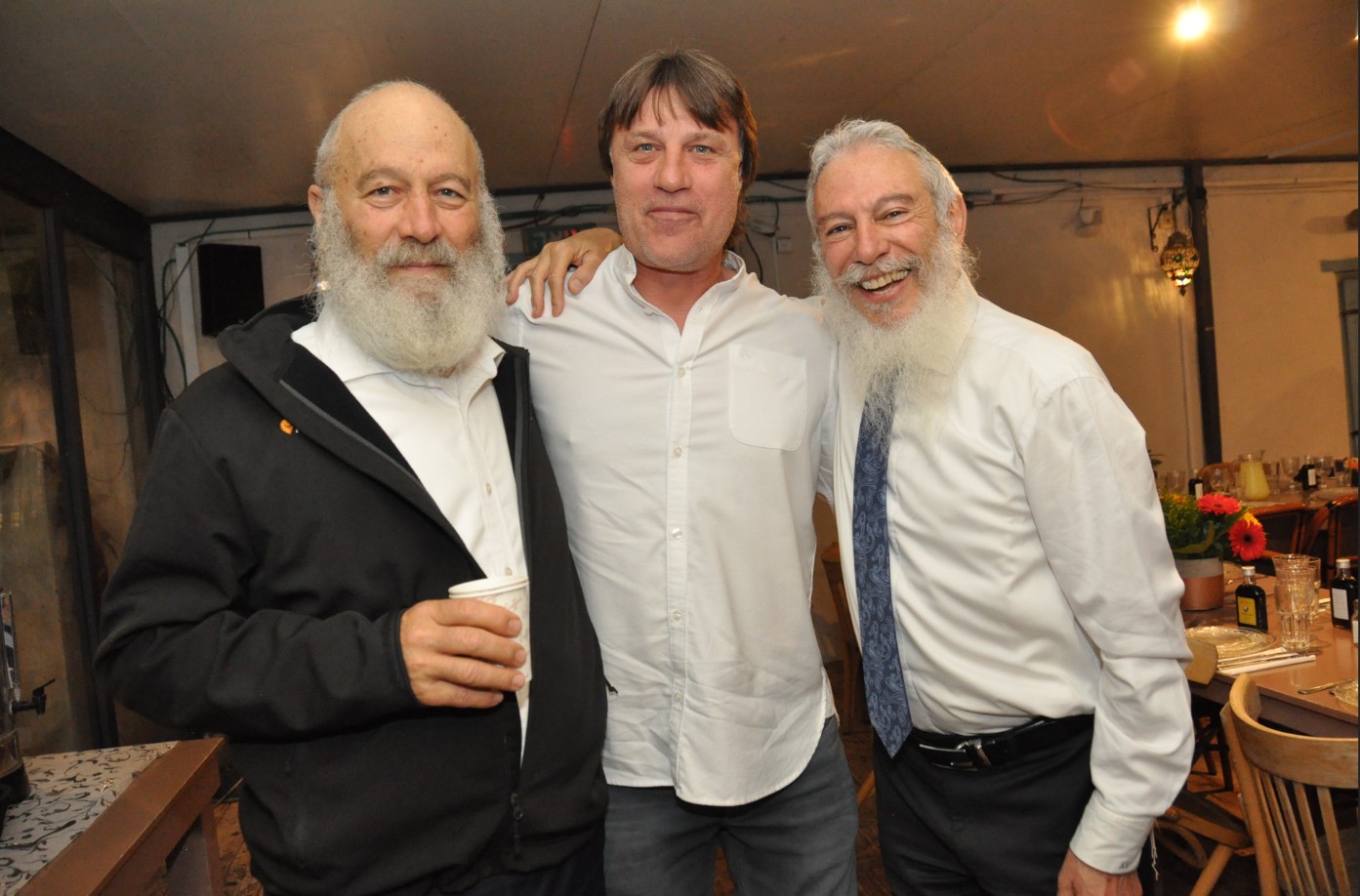The King of the Field: The Rabbi Who Supports Israeli Soccer Stars
A random act of laying tefillin at a mall in Los Angeles changed Rabbi Ami Paikowsky's life. Today, he influences many of the top Israeli soccer players and, through them, influences thousands of young people. Interview
 (Photo: Yehuda Segev)
(Photo: Yehuda Segev)It's known that the work of Chabad emissaries, both in Israel and abroad, is interesting, challenging, and unique. Yet, even among Chabad devotees, there are emissaries whose missions are extraordinarily captivating. Such is the story of Rabbi Ami Paikowsky, Chabad emissary to soccer stars, who influences numerous top players in Israel's Premier League.
Rabbi Paikowsky (66), residing in Jerusalem, is married to Iris, an artist specialized in painting, and they have four children and seven grandchildren. It’s tempting to delve into the eventful life of Rabbi Paikowsky and his influence on Israeli opinion leaders, but our conversation first veers into a historical narrative that adds important depth and dimension to all his activities.
"I was born in North Tel Aviv, in the Sela housing block, an area of freedom fighters," Rabbi Paikowsky recounts. "My parents were fighters in the Lehi organization. On my mother's tombstone, it says, 'the mother of the underground.' Fighters fleeing from the British would come to my mother to hide, knowing they'd get everything they needed there.
"My father immigrated to the country shortly before Hitler entered Poland. At that time, Jabotinsky urged the Jews to flee and come to the land. He said that if the Jews don’t end the diaspora – the diaspora will end them. Not long after, my father took the Betar oath. Not many were privileged to do so. Even Begin was among the few.
"My father, understanding the situation, urged all his family to move to Israel as soon as possible. His father heard him but said they'd move in another six months. When my father left home, all his family escorted him to the train. It was the last time he saw them. All of them were murdered in the Holocaust.
"Many years later, I traveled with my siblings to my father's city, and we saw their house. We met a 97-year-old woman who showed us everything. It was very emotional, but the peak was when we reached the mass grave. 2,500 people from that town. We also offered to take my father, but he refused to come, saying he couldn’t handle it. My father was a strong and very tough man, but he would always cry when talking about it."

What do you know about your father's actions in the Lehi organization?
"My father's commander was Yitzhak Shamir, who later became the Prime Minister. In 1974, a year after the Yom Kippur War, I left the country for Los Angeles. Shamir came to visit the city and stayed at the luxurious Four Seasons hotel. Access was granted to a few Israelis wanting photos with him, myself included.
"As I approached him, he asked my name, and I said Paikowsky. He asked, 'Are you Shlomo's son?' When I confirmed, he said he loved him very much and that they didn't need to turn on the light when he entered a room.
"Speaking of Shamir, when my father passed away, I held a memorial service for him. I invited surviving underground fighters, friends, Shamir, and Rabbi Groner, the secretary of the Lubavitcher Rebbe. During the memorial, Shamir told me: 'Presidents make mistakes. Prime Ministers make mistakes. Ministers make mistakes. Even kings make mistakes. But the Lubavitcher Rebbe never made a mistake.'
"In response, I told him that the Rebbe said not to negotiate peace deals with the Arabs, not a single word, so why did he do it? Shamir banged on the table and said: 'I told you the Rebbe wasn’t wrong. We shouldn’t even consider negotiations with them. It only complicates things. It was a mistake, and I'm aware of its negative ramifications.'
"Regarding my father's activities, one day, I asked him to tell me a military secret. He thought for a moment, then took me to the attic and showed me a very old suitcase hidden there. Sharing the secret, he told me that this suitcase was part of an operation against an important British Lord, which greatly influenced the British withdrawal from the country. That was all he said."
The Sacred Antenna
"My house was very secular. We simply didn't know anything. Only on Yom Kippur did we go to synagogue," Paikowsky now says of himself. "In my youth, I played for Beitar Tel Aviv, then in the senior team, and later I moved to Beitar Ashdod. I served in Intelligence during the army, and after my release, I traveled to the United States for a trip. This trip lasted 36 years."
Why did you stay there for so long?
"I quickly started working and saw success. I initially sold clothes at local markets and then grew to open a store in Los Angeles. Its size was immense. Today, it houses six large stores. From here, and this is the main point, every Friday young Chabadniks would come to put tefillin on me and other Jews.
"Businesspeople are naturally skeptical, and I thought they came for money. One day, I asked a young Chabadnik why they came here to put tefillin on Jews. He told me that just like there’s an antenna in cars that helps the radio play songs well, so tefillin are an antenna for all holiness. He said that the Rebbe taught them there's a Jewish point covered in some Jews, but it can be revealed through tefillin.
"This statement turned my stomach. I was far removed from Judaism and a tough businessman, but it ignited a desire to understand what’s in the Torah. Initially, I would drive over for Shabbat meals at the local Chabad emissary’s house, gradually getting to know and learn more.
"Shortly after, I decided to close my store on Shabbat. Logically, it seemed like a suicide for the business. The vast majority of sales happened on Shabbat. On weekdays, I might sell $200, but on Shabbat, $10-15,000. Closing meant shutting down entirely."
It sounds like a particularly tough decision for someone still far from their Judaism.
"Yes, definitely not easy, but I decided to go for it and searched desperately for someone to take over the lease. During those days, it was the hottest area in Los Angeles, yet I couldn’t get rid of the store. I searched frantically but found no one. The emissary I was in contact with advised me to write to the Rebbe about it and wait for his response.
"So I did. I wrote to the Rebbe that I wanted to close the store on Shabbat, not suffer financially, and simply find someone to take over the lease. A week later, I received a reply from the Rebbe. A letter and 18 dollars. The Rebbe instructed me to close early every Friday before sunset, spread Torah in my location, and give the 18 dollars to charity where I was.
"Immediately after receiving the answer, I went to the landlord and told him I wanted out of the lease. He got very angry and said there is no way he would let me out without a replacement. I left him and returned to the store feeling discouraged.
"A few minutes after getting back, someone came in saying they wanted to buy the lease for the store. He calculated a 20-year period ahead, the time left on the lease, and paid me a fortune. With that money, I bought a house and opened a factory, which greatly helped me later. I invested in various ventures from which I earn a respectable living to this day. Closing the business also helped me decide to immigrate to Israel."

"At that moment, the penny dropped"
When he arrived in the country, after 36 years in the U.S. and during the Chanukah holiday, Rabbi Paikowsky participated in a special lesson for businesspeople at the "Toldot Emmanu" yeshiva in Ramat Aviv. Rabbi Ginzburg, who delivered the lesson, said that anyone who thinks they’re only coming to enjoy the lesson and go home is greatly mistaken. Each of us needs to think about who isn’t lighting candles now; who doesn’t have candles and a menorah; who doesn’t even know they should light them, and so on. "At that moment, the penny dropped, and I felt and knew I could do much in this area," the Rabbi recounts. "That year, Eli Cohen coached Beitar. We spent a lot of time together in our youth before I traveled abroad. I got Eli's number, and he was very glad to hear from me. I asked him who their next game was against, and he told me they were playing against Maccabi Tel Aviv in Ramat Gan. 30,000 spectators.
"I was very moved by the mere possibility of this grand Kiddush Hashem, and I asked him not to laugh but that I wanted to ask something, and I asked if he minded if I lit a menorah on the field. He replied, 'Should I laugh? Are you normal? All the Israelis on my team put tefillin, and I do every day too. Not only do I want you to light on the field, but I also want you to light at the hotel before the game.
"I was so happy. I came to the hotel and saw on the lapels of the players’ shirts a menorah with seven branches. I asked if they knew why the Chanukah menorah has eight candles and on their shirts only seven. One of the players said it was probably a mistake. I immediately corrected him and told them it wasn’t a mistake. That's how the menorah looked in the Temple, just like the one on their shirts.
"This put them in a frenzy. And suddenly everyone started singing 'We believe, sons of believers' with great excitement. At one in the morning, Eli Cohen called and shared that the players succeeded in their game and wanted more. Since then, we've had an extensive activity. For many years now, I’ve been closely connected with many soccer players, some of the leading ones in the country, who influence countless young people. I put tefillin on them, speak Torah words with them, give them matzos before Passover, a Megillah on Purim, Chanukah candles, and the like."
How are you received by the coaches and club managers? Do you sometimes get hostile reactions?
"The truth is there's a bit of both. A few years ago, Beitar Jerusalem had a coach who saw me lighting candles with the players and told me candidly that his mother was Jewish. He recounted that in his youth, she bought him tefillin, but he never once put them on. I checked the tefillin he had, returned them kosher, and he simply began to tremble when putting them on for the first time.
"Beyond that, a few years later, he coached Maccabi Netanya, and in that year they were relegated. They were on the verge of bankruptcy, but I told him if he puts tefillin on and strengthens himself in the commandments, the situation will improve. And he did indeed get promoted with Netanya and received great praise. He still puts tefillin on to this day.
"There are also many parents who are happy with my activities. I initiated a project with Beitar's football fans. Some mothers want their sons to take pictures with the players, so I made a deal with them that whoever learns a chapter of Tanya by heart—I’d give him a signed soccer ball. Every week, I give ten balls to kids who learned, and I quiz them.
"But yes, alongside that, there are people who oppose and try to put obstacles in my way. Some people have no connection to the soccer world at all but begrudge the fact that they let a Rabbi into soccer clubs. Even in Beitar, there’s opposition. The club’s owner, Eli Tabib, is very supportive, but there are people who very much don’t want to see me there. And yes, it’s very hard when you enter a certain place and know there are people who don’t want to see you. It hurts the heart."
In conclusion, Rabbi Paikowsky wishes to say something about a recent religious and social issue that has surfaced in the headlines. "There are many, many players who tell me it pains them that they have to play on Shabbat, but they’re forced to. In the National League, several players have banded together, went to court, and rightly said that playing on Shabbat is illegal, and the judge agreed with them.
"The matter went to the Supreme Court, but curiously in this case, it decided not to decide, saying that the government should rule on the subject. There's a committee in the Knesset organized by MK Miki Zohar, dealing with this issue. We brought 250 signatures of active players who don’t want to play on Shabbat, but so far nothing has moved. Meanwhile, we continue to pray and strive."

